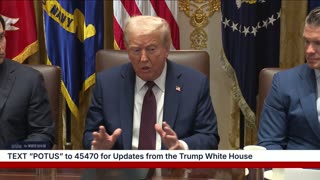Premium Only Content

Balancing Act: Federalism, State Sovereignty, and Border Security
## Border Security
Border security remains a complex and divisive issue in American politics. Securing national borders is integral to a country's sovereignty and security. The United States is no exception to this rule, especially when it comes to its southern border with Mexico. While calls for a secure border resonate with a wide range of the populace, methodologies and the underpinning reasons for a secure border are subjects of political contention. For many, the focus is on curbing illegal immigration and its associated challenges such as human trafficking, drug smuggling, and potential security threats.
Recent Supreme Court decisions pertaining to border security have brought into sharp relief the intricate balance between federal and state authority. These high-profile cases highlight the constitutional debates that arise when states take unilateral action to fortify their borders, as seen with the state of Texas's efforts to combat the influx of illegal crossings. While the federal government holds the primary responsibility for securing the nation's borders, state-level initiatives have underscored a persistent tension and a desire for more robust enforcement measures that reflect local priorities and concerns.
## Presidential Politics and Memorabilia
Turning to a lighter note in political discourse, the significance of presidential history and memorabilia in shaping public consciousness cannot be overstated. Collecting political memorabilia is more than a hobby; it’s a way through which enthusiasts engage with the nation’s political heritage. Items such as campaign posters, Toby jugs, and unique trinkets serve as tangible connections to the political giants of the past, like Robert A. Taft and Herbert Hoover. Taft, known affectionately as Mr. Republican, was emblematic of the America First brand of conservatism during the mid-20th century.
## Legislative Dynamics and Slow Starts
The Iowa legislative session, mirroring other state legislative bodies, often experiences periods of rapid activity juxtaposed with slower, more contemplative times. Factors contributing to these ebbs and flows include holidays, weather disruptions, and even the occurrence of political events such as caucuses. Legislators find themselves navigating complex schedules while aiming to meet constituents' needs and address pressing legislative matters.
This pace can influence the type of legislation that advances. While some sessions see a flurry of significant bills, others may focus on fewer, more substantial legislative efforts that require meticulous drafting and consideration.
## Scrutiny of Educational Policy
In the realm of education, the AEA bill currently commands attention, indicative of the delicate balance required when it comes to policymaking in this sector. The dialogue around this piece of legislation reflects broader conversations about the allocation of educational resources and the implications for property taxes - all of which are critical to determining the sustainability of funding models and their impact on taxpayers.
Additionally, there are legislative efforts that aim to enhance civic education. These bills, while not always at the forefront of policy debates, underscore the importance of inculcating a robust understanding of history and governance among students. Such initiatives strive to fortify the fabric of democracy through informed citizenry.
-
 DVR
DVR
Stephen Gardner
36 minutes ago🔥Trump's Moves Leave CNN Speechless!
2644 -
 1:06:37
1:06:37
Sean Unpaved
3 hours agoCincinnati's Sack King Stays: Decoding the Deal & the NFL's Open-Ended Questions
26.3K -
 LIVE
LIVE
StoneMountain64
3 hours agoWARZONE LEGEND RETURNS. GHILLIE SUIT $20k TOURNEY.
200 watching -
 2:11:17
2:11:17
Side Scrollers Podcast
5 hours agoINSANE Illegal Migrant Propaganda Xbox Game + Paypal REFUSES To Pay Dev + More | Side Scrollers
28.9K -
 LIVE
LIVE
SportsPicks
3 hours agoCrick's Corner: Episode 72
78 watching -
 30:39
30:39
ROSE UNPLUGGED
1 hour agoMore of Less: Purpose, Discipline & the Minimalist Mindset
6.36K -
 1:02:18
1:02:18
Timcast
4 hours agoDemocrat States Ignore English Language Mandate For Truckers, DoT Vows Crackdown Amid Trucker Mayhem
151K43 -
 1:57:04
1:57:04
Steven Crowder
6 hours agoAdios & Ni Hao: Trump Sends Abrego Garcia to Africa But Welcomes 600K Chinese to America
335K292 -
 3:54:14
3:54:14
The White House
6 hours agoPresident Trump Participates in a Cabinet Meeting, Aug. 26, 2025
54.2K28 -
 1:18:51
1:18:51
Rebel News
3 hours agoCarney's flawed LNG deal, Libs keep mass immigration, Poilievre's plan to fix it | Rebel Roundup
24.9K10